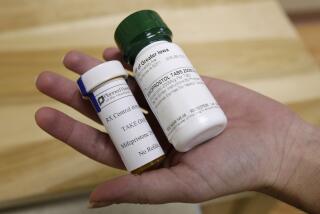Mental Patients Allowed to Refuse Drugs
SAN FRANCISCO — The state Supreme Court has abruptly reinstated an appellate ruling that gives California’s more than 150,000 involuntarily held mental patients the right to refuse antipsychotic drugs.
The court’s surprise action came more than a year after the justices had agreed to review the decision and had received briefs from a wide range of medical authorities, government officials and patients’ rights groups concerned about the far-reaching implications of the case.
The justices, without hearing argument or issuing an opinion, issued a brief order Thursday dismissing the case and reinstating the 1987 decision by a state Court of Appeal, which becomes binding on trial courts throughout the state.
Judge Can Require Drugs
Under the appellate court ruling, patients committed involuntarily by county medical officials for three-day or 14-day periods under state statutes may refuse to take mood-altering drugs unless a judge rules that they are incompetent or that there is a threat of death or serious bodily harm to the patient or others.
Lawyers for hospitals challenging the ruling said Friday that the decision will greatly impede effective treatment of the mentally ill, force more use of physical restraints on patients and impose near-impossible burdens on medical authorities and judges to resolve disputes over medication under limited time constraints.
“It’s just not realistic to expect a judge to pass on these cases within 72 hours,” said Ezra Hendon, an attorney for St. Mary’s Hospital and Medical Center in Oakland.
“The net effect of this ruling is that there will be more people out on the streets pushing shopping carts and sleeping on grates,” he said. “This decision may satisfy someone’s notion of an abstract principle, but the patients who supposedly would benefit are going to be denied effective treatment.”
Ross E. Campbell of Burlingame, a lawyer for the California Assn. of Hospitals and Health Systems and the Hospital Council of Southern California, called the court’s action “very unfortunate.”
“These medications are one of the primary modes of initial treatment,” Campbell said. “Involuntarily detained patients are often very difficult to manage and very, very sick. . . . There is no way to treat them until they receive drugs.”
‘Positive Impact’
But Morton P. Cohen, an attorney representing the patient who successfully challenged forced medications, said the ruling will have a “positive impact.”
“What this case essentially does is give the mentally ill the same rights as the mentally healthy,” said Cohen, a professor at Golden Gate University Law School in San Francisco. “Too often, these drugs are used as a substitute for adequate staffing in hospitals.”
Cohen noted that drugs can still be administered in legitimate emergencies and predicted that most patients eventually will agree to take medications when they are able to negotiate with hospital authorities. “And when people can work things out with the hospital, they will be more likely to stay on with the treatment when they go back on the street,” he said.
The dispute arose in a class-action lawsuit filed in 1985 against St. Mary’s Hospital by lawyers for Eleanor Riese, a 45-year old San Francisco woman described in court documents as a chronic schizophrenic. Riese had been taking the drug Thorazine but then refused further medication. After the woman engaged in violent and bizarre acts, she was committed involuntarily and hospital authorities forcibly injected the drug.
The suit, citing potential adverse side effects from antipsychotic drugs, argued that involuntarily committed patients should have the same right to refuse medication as patients who commit themselves.
Decision Overturned
A San Francisco Superior Court judge rejected the suit, but in December, 1987, a state Court of Appeal overturned that decision and upheld Riese’s contentions.
The hospital’s subsequent appeal to the state Supreme Court drew support from the state Department of Mental Health, the California Psychiatric Assn. and a long list of county authorities.
Lawyers for Los Angeles County noted that in 1988 more than 26,000 people were committed involuntarily for 72-hour periods in the county. Taking disputes over medication to the courts could place a huge burden on the local judiciary, they said.
Administering drugs opens the way for further therapy, the county said, and if such treatment cannot be provided, mental health facilities “will be nothing more than penitentiaries, and patients will become the losers.”
More to Read
Sign up for Essential California
The most important California stories and recommendations in your inbox every morning.
You may occasionally receive promotional content from the Los Angeles Times.










